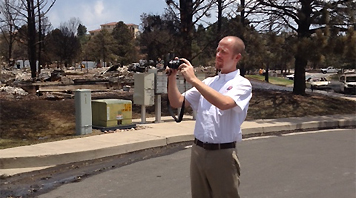|
7951 E. Maplewood Avenue, Suite 110
Greenwood Village, Colorado 80111
Serving Colorado, New Mexico, Utah & Wyoming
Contact: Carole Walker, Executive Director
303-790-0216 or toll free 800-355-9524
June Marks the Start of Colorado's Peak Hail, Flood & Severe Weather Months—With Temperatures Heating Up Colorado Residents Need to Be Prepared!
June 1, 2011 – June and July are historically the months when Mother Nature's wrath hits Colorado with full force. Six of the state's top ten most expensive storms have occurred in June and July—the majority being multi-million dollar hail and wind storms. In addition with temperatures heating up, the big melt in Colorado's high country sets the stage for rising flood waters.
"We are entering that time of year when Mother Nature takes us on a weather rollercoaster ride with almost daily doses of severe weather and tornado warnings," says Carole Walker, Executive Director of the Rocky Mountain Insurance Information Association. "That means we need to take preventative steps such as considering how much insurance coverage you have to fix your car, repair or rebuild your home and replace your personal belongings. Home and business owners also should be aware that a separate flood insurance policy needs to be purchased at least 30 days in advance of rising waters."
For more information:
http://www.rmiia.org/Catastrophes_and_Statistics/Hail.asp
http://www.rmiia.org/Catastrophes_and_Statistics/Flood.asp
Colorado's Most Costly Hail Storms
With the exception of the May 22, 2008, Windsor tornado and the hailstorm that hit Pueblo on July 29, 2009, Colorado's ten most costly hailstorms were centered in the Denver Metro area (which makes sense, because that's where the largest concentration of property in the state is located).
| Date |
Location |
Cost When Occurred
(Millions) |
2009 Dollars
(Millions)* |
| July 20, 2009 |
Denver Metro |
$767.6 |
--- |
| July 11, 1990 |
Denver Metro |
$625.0 |
$1.03 Billion |
| June 6-15, 2009 |
Denver Metro |
$353.3 |
--- |
| June 13-14, 1984 |
Denver Metro |
$276.7 |
$571.3 |
| July 29, 2009 |
Pueblo |
$232.8 |
--- |
| October 1,
1994 |
Denver Metro |
$225.0 |
$325.7 |
| May 22, 2008 |
Windsor |
$193.5 |
$192.8 |
| June 8-9, 2004 |
Denver Metro |
$146.5 |
$166.4 |
| August 11, 1997 |
Denver Metro |
$128.0 |
$171.1 |
| May 22, 1996 |
Denver Metro |
$122.0 |
$166.8 |
*2009 estimated cost calculations based on the Consumer Price Index.
RMIIA recommends that you take these preventative steps:
DO AN ANNUAL INSURANCE CHECK-UP
- Insurance is something most people don't even want to think about until they need it the most. But, understanding what is and isn't covered in your homeowners' insurance policy can mean the difference of being able to rebuild your home and replace your personal belongings. Homeowners need to do annual insurance policy "check-ups" to make sure they keep up with local building costs and have adjusted their coverage to include home remodeling and additions.
- If you don't have replacement coverage, consider spending a few extra dollars for coverage that pays for the cost of replacing the damaged property without deduction for depreciation.
KNOW WHAT IS & ISN'T COVERED
- The typical homeowners' insurance policy covers damage resulting from fire, windstorm, hail, water damage (excluding flooding), riots and explosion as well as other causes of loss, such as theft and the extra cost of living elsewhere while the structure is being repaired or rebuilt.
- Hail and flood damage to your car is covered only if you have purchased optional comprehensive insurance on your auto policy.
- A standard home or business insurance policy does not cover flooding, so you may want to look into flood insurance coverage if you're concerned that you're at risk for rising floodwaters.
CREATE A HOME INVENTORY
- Make a home inventory that includes lists, pictures or a videotape of the contents of your home or apartment. After all, would you be able to remember all the possessions you've accumulated over the years if they were destroyed by a tornado or fire? Having an up-to-date home inventory will help get your insurance claim settled faster, verify losses for your income tax return and help you purchase the correct amount of insurance.
Log on to www.rmiia.org for more information.
###
Rocky Mountain Insurance Information Association is a non-profit consumer information organization. Affiliated with the Insurance Information Institute, RMIIA has been serving consumers and the media since 1952.
|

